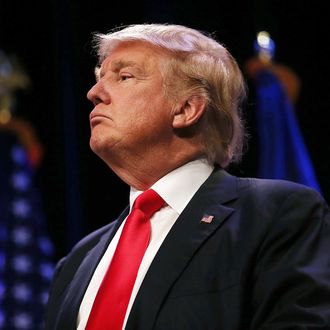
In Tuesday night’s official Republican response to the State of the Union address, South Carolina governor Nikki Haley took the unprecedented step of devoting significant portions of her speech to thinly veiled criticisms of the current national poll leader for the GOP presidential nomination. It is extremely unlikely this was some unilateral act by Haley. At roughly the same time, Jeb Bush came under intense Beltway Republican criticism for running negative ads against Marco Rubio that might indirectly help Trump. So even if the GOP Establishment has not yet decided on a nominee for its party (as most political scientists and many pundits believe it has the power to do), it has most emphatically decided against Trump. But as voting in Iowa and New Hampshire grows nigh, that may simply not be enough.
There were sighs of relief in all precincts of Official Republicandom last month when polls in Iowa began showing a surge for Ted Cruz that put Trump in second place. He could, it was gratefully assumed, be mortally wounded in Iowa, and then polished off in New Hampshire or South Carolina, leaving the task of taking out the convenient but obnoxious Cruz to later states once the Establishment had finally chosen its own champion. Order might yet be restored to a process that had looked like it was getting out of control.
But as a new Des Moines Register/Bloomberg Iowa poll from the much-esteemed Ann Selzer confirms, a Trump loss in Iowa is not a foregone conclusion. Since the last Selzer poll in December, Cruz’s ten-point lead over Trump has shrunk to just three points. That’s partly because Cruz has come under attack from other candidates, and also from Iowa’s powerful ethanol industry, which benefits from federal support policies the Texan opposes.
The big question is whose supporters will turn out, and while the reigning assumption is that Trump’s fans are marginal voters who’ll probably find something better to do on a cold February night than spend an hour or so at a caucus site, Selzer’s data suggests caution in writing them off. For one thing, the percentage of likely caucusgoers who report they’ve never attended before — among whom Trump has a sizable lead — is steadily rising as February 1 approaches. A similar rise on the Democratic side in 2008, spotted by Selzer at the time, turned out to portend Barack Obama’s easy win that year. And like other pollsters in various states, Selzer is finding that Trump fans are more committed to their candidate than those in other camps. That does not mean they will actually vote, but does mean Trump’s get-out-the-vote effort will benefit from the superior efficiency associated with knowing the people you mobilize will vote the right way.
Meanwhile, Selzer does not show much momentum for the rest of the GOP field. Marco Rubio and Ben Carson are battling for a relatively distant third place among likely caucusgoers, and everyone else is mired in the low single digits. Cruz and Rubio lead the field in second-choice preferences, which could matter a lot if there is late movement in public opinion; there could still be a Cruz blowout or a Rubio surge that scrambles the order of finish in unpredictable ways, and other candidates may frantically try to take down one of the stronger candidates, as Team Bush appears to be trying to do with its attack ads on Rubio.
All in all, Iowa remains a puzzle, and so, accordingly, does New Hampshire, particularly if the votes of those who fear Trump and loathe Cruz continue to be divided among Rubio, Christie, Kasich, and Bush, all of whom are now looking to the Granite State for salvation. Perhaps Trump will be crashing and burning by the time the circus rolls into South Carolina for its February 20 primary (held the same day as Nevada’s caucuses), and its governor will be toasted for helping to make that happen. But don’t undersell the possibility that the state that rejected Haley’s candidate, Mitt Romney, in 2012 in favor of the unlikely figure of Newt Gingrich will again thumb its nose at the party’s decisions.






























